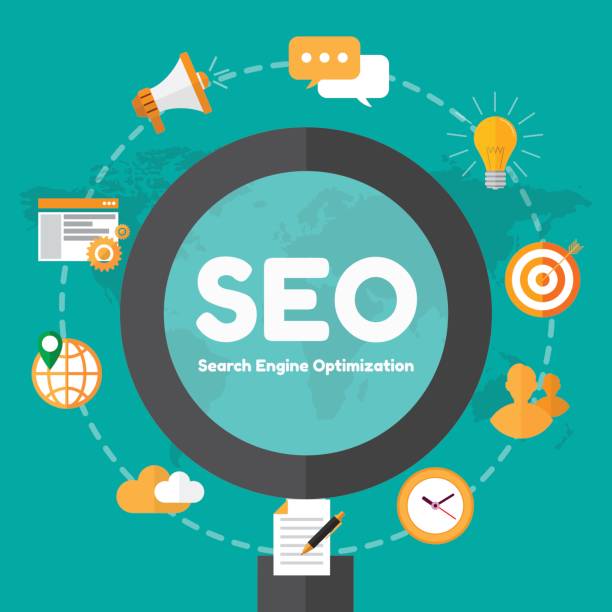Understanding the Concept of Off-Page SEO and Its Importance

In today’s highly competitive web world, simply producing high-quality content is not enough for success.
For your site to be seen among a multitude of competitors and achieve high rankings in search results, you need comprehensive #Search_Engine_Optimization or #SEO strategies.
One of the main pillars of these strategies is Off-Page SEO.
Off-page SEO refers to a set of activities performed outside your website, aiming to increase your domain’s credibility, reputation, and influence in the eyes of search engines.
Unlike On-page SEO, which focuses on optimizing elements within the site such as content, keywords, URL structure, and loading speed, Off-page SEO focuses on signals sent to your site from external sources.
The most important and well-known component of off-page SEO is Link Building.
Every high-quality backlink from a reputable site is considered a vote of confidence for your website and increases your Domain Authority in Google’s eyes.
This increase in credibility directly impacts your site’s ranking for various keywords.
The importance of off-page SEO lies in the fact that search engines largely measure a site’s credibility and popularity based on these external signals.
A website with strong and natural backlinks appears more trustworthy and authoritative in Google’s view, even if its content alone is not flawless.
Therefore, investing in proper off-page SEO strategies is crucial for any business seeking online visibility and organic traffic acquisition.
Did you know that 85% of customers check your company’s website before any interaction?
With RasaWeb, build a corporate website worthy of your credibility.
✅ Increase customer credibility and trust
✅ Attract high-quality leads
⚡ Get free website design consultation
What is the Difference Between Off-Page SEO and On-Page SEO?

To fully understand the concept of website optimization, it is essential to know the key differences between on-page SEO and off-page SEO.
These two parts complement each other, and neither can be successful on its own.
On-Page SEO refers to all actions performed directly on your website to optimize it for search engines.
These actions include content optimization, proper use of keywords in the text, headings (H1, H2, H3), meta descriptions, image Alt tags, URL structure optimization, page loading speed, mobile responsiveness, and user experience (UX).
The main goal of on-page SEO is to help search engines correctly understand the topic and structure of your content and display it to relevant users.
All changes and optimizations in on-page SEO are under your direct control and performed within the website.
In contrast, Off-Page SEO refers to activities performed outside your website, aiming to increase your website’s credibility and authority in the eyes of search engines.
The most important and effective part of off-page SEO, as mentioned before, is building high-quality backlinks from other sites.
But off-page SEO is not limited to backlinks.
Activities such as content sharing on social networks, brand mentions, participation in relevant forums and communities, and even Influencer Marketing are also considered part of off-page SEO strategies.
The fundamental difference between the two lies in where the actions are performed: one within the site and the other outside the site.
On-page SEO tells search engines “what your site is about,” while off-page SEO shows them “how credible and trustworthy” your site is.
Both are essential for a comprehensive SEO strategy and achieving high rankings.
Backlink Structure and Its Strategies in Off-Page SEO

Backlinks form the backbone of off-page SEO, and understanding their types is crucial for implementing a successful strategy.
In fact, the quality and quantity of backlinks play a pivotal role in determining a website’s credibility in the eyes of search engines.
Backlinks can be categorized based on various characteristics.
The two main types of backlinks include Dofollow and Nofollow backlinks.
Dofollow backlinks transfer authority (Link Juice) from the source site to the destination site and have a direct impact on SEO and site ranking.
In contrast, Nofollow backlinks (marked with rel=”nofollow”) do not transfer this authority and are primarily used to prevent SEO abuse or spam link building.
However, having a mix of both link types provides a more natural representation of your backlink profile.
There are several strategies for building backlinks in off-page SEO, each with its own approach:
- High-Quality and Valuable Content Creation: The best way to naturally attract backlinks is to create content that is so useful and unique that others are willing to refer to it.
This content can include in-depth articles, infographics, case studies, or free tools. - Guest Posting: Writing articles for other relevant and reputable websites and including a link to your site within that article.
This method, in addition to backlinks, also helps with branding and attracting referral traffic. - Broken Link Building: Finding broken links on other websites, then creating similar content to the broken link’s content and suggesting it to the webmaster.
- Resource Page Link Building: Identifying pages that list useful resources in a specific industry and suggesting your content as a valuable resource.
- Identifying and Reclaiming Lost Links: Sometimes sites that previously linked to you might remove that link.
Monitoring your backlink profile and trying to restore these links is very important.
Choosing the right off-page SEO strategy depends on the industry, website type, and available resources.
It’s important to always focus on the quality and relevance of links, not just the quantity.
| Backlink Type | Description | Impact on Off-Page SEO |
|---|---|---|
| Dofollow | Links that transfer authority and ranking power from the source site to your site. | Very effective in increasing domain authority and ranking. |
| Nofollow | Links that tell search engines not to transfer authority. Typically marked with rel=”nofollow”. |
Less direct impact on ranking, but can increase traffic and brand mentions. |
| Sponsored | Paid links that must be marked with rel=”sponsored” to inform search engines of their promotional nature. | If not properly marked, they may lead to Google penalties. |
| User-Generated Content (UGC) | Links created by users in comment sections, forums, etc., and should be marked with rel=”ugc”. | Similar to nofollow, less direct impact on ranking, but helps with the naturalness of the link profile. |
Crucial Criteria for Evaluating Backlink Quality in Off-Page SEO

In the realm of off-page SEO, not all backlinks hold the same value.
In fact, focusing on link quality is far more important than their quantity.
A low-quality link not only fails to help your site’s ranking but can even lead to a Google penalty due to its resemblance to spam link-building.
Therefore, familiarity with backlink quality evaluation criteria is essential for any SEO specialist or website owner looking to improve their off-page SEO.
The most important criteria for evaluating backlink quality include:
- Domain Authority & Page Authority: These two metrics (provided by Moz) indicate the power and credibility of a specific website or page in the eyes of search engines.
Backlinks from sites with high DA and PA have significantly more value. - Relevance: A link from a website that is topically relevant to your content has more value.
For example, a link from an educational website to an article about SEO will be much more relevant and valuable than a link from a clothing store website.
Search engines consider semantic relevance between sites very important for transferring authority. - Link Placement: A link located within the main body of a page and surrounded by relevant paragraphs is more valuable than a link found in the footer, sidebar, or comment section.
- Anchor Text: The anchor text (the word on which the link is placed) should be natural and relevant to the content of the destination page.
Overuse of exact match keyword anchor texts can be considered spam.
Diversity in anchor texts is essential for healthy off-page SEO. - Source Site Traffic and Visitors: A link from a site that itself has high and stable organic traffic usually indicates the credibility and quality of that site and can also bring valuable referral traffic to your site.
- Absence of Spam (Spam Score): Some tools provide a metric called “Spam Score,” which indicates the likelihood of a domain being spammy.
It is highly advisable to avoid receiving links from sites with high spam scores, as they may harm your site and weaken your off-page SEO.
By considering these criteria, you can formulate a smart strategy for your off-page SEO and focus solely on acquiring high-quality and effective backlinks.
Does your current site represent your brand’s credibility as it should? Or does it scare away potential customers?
RasaWeb, with years of experience in professional corporate website design, is your comprehensive solution.
✅ A modern, beautiful, and brand-aligned website for your brand identity
✅ Significant increase in lead generation and new customers
⚡ Contact RasaWeb now for a free corporate website design consultation!
The Role of Social Networks and Branding in Off-Page SEO

Alongside backlinks, off-page SEO also includes other signals that increase a brand’s credibility and visibility.
One of these important signals is activity on social networks and focusing on branding.
Although social media shares and likes are not directly counted as backlinks and do not transfer “Link Juice,” they have an indirect impact on SEO and off-site optimization that should not be overlooked.
The impact of social networks on off-page SEO can be examined from several perspectives:
- Increased Visibility and Traffic: Content shared on social networks has a greater chance of being seen by a wider audience.
This can lead to an increase in direct traffic to your website.
If your content is widely shared on social networks, the likelihood of it being seen by webmasters and bloggers, leading to natural backlinks, increases. - Increased Brand Mentions: Whenever your brand name is mentioned on social networks, blogs, forums, or other platforms (even without a link), it counts as a brand mention.
Search engines pay attention to these mentions and consider them as a sign of a brand’s popularity and credibility.
This can help strengthen your authority and credibility in search results. - Strengthening Reputation and Trust: An active and positive presence on social networks helps build and strengthen your online reputation.
Direct communication with the audience, responding to comments, and solving problems build user trust.
This trust, albeit indirectly, can affect your click-through rate (CTR) and ultimately your ranking, as Google values user interaction signals. - Link Building Opportunities: Consistent and targeted activity on social networks can create opportunities for natural link building.
For example, if you produce valuable content and share it on social networks, other individuals and websites may link to it.
Therefore, for a comprehensive off-page SEO strategy, the power of social networks and branding should not be overlooked.
These platforms not only help your content gain visibility but also indirectly impact your search rankings by increasing brand credibility and reputation.
Google Algorithms and Their Impact on Off-Page SEO

Google constantly updates its algorithms to provide more accurate, relevant, and higher-quality search results.
These updates have a profound impact on SEO strategies, especially off-page SEO.
Understanding these algorithms and how they affect off-site optimization is essential for staying at the top of search results.
One of the most important algorithms that directly impacted off-page SEO is the Penguin algorithm, first introduced in 2012.
Penguin’s main goal was to combat spammy and unnatural link-building.
Before Penguin, many websites gained rankings by using black-hat SEO techniques such as buying bulk, low-quality links, or overusing keyword-rich anchor texts.
Penguin created a major shift in the world of off-page SEO by identifying and penalizing these websites.
This algorithm harmed sites with unhealthy backlink profiles and emphasized the quality, relevance, and naturalness of backlinks.
After the Penguin update, SEOs were forced to change their approach from “any link is good” to “only high-quality and natural links are valuable.”
Other algorithms such as Hummingbird, which focuses on understanding the semantic meaning of searches, and RankBrain, which uses artificial intelligence to better understand complex queries, also indirectly affect off-page SEO.
These algorithms help Google evaluate a website’s credibility not only based on the number of links but also on topical relevance and the overall quality of the linked content.
For example, if your site has backlinks from reputable and relevant sources, it is more likely to be recognized as an authority by Google, and this also impacts ranking under semantic algorithms.
In summary, Google’s algorithmic updates constantly drive off-page SEO strategies towards transparency, quality, and naturalness.
To succeed in this area, one must always stay informed of the latest changes and avoid any attempts to deceive search engines, as such actions will ultimately lead to penalties and a drop in rankings.
Off-page SEO should be built on real value and mutual trust with other sites.
Essential Tools for Analyzing and Improving Off-Page SEO

For your off-page SEO strategies to be effective and data-driven, you need to use specialized tools.
These tools help you analyze your backlink profile and your competitors’, discover new link-building opportunities, and monitor your progress in off-page SEO.
Choosing the right tools can make a significant difference in the effectiveness of your campaigns.
Below are some of the most essential tools used in the field of off-page SEO:
- Ahrefs: One of the most powerful tools available in the market for backlink analysis and keyword research.
Ahrefs has a massive database of backlinks and allows you to thoroughly examine your own backlinks, your competitors’, and new link-building opportunities.
Its features like Site Explorer, Content Explorer, and Keyword Explorer are unparalleled for off-page SEO. - Semrush: A comprehensive SEO platform that offers powerful tools for competitor analysis, keyword research, backlink analysis, and rank tracking.
The Link Building Tool in Semrush helps you identify and manage link-building opportunities. - Moz Pro: This tool includes features such as Link Explorer (for backlink analysis), Keyword Explorer, and MozBar (browser toolbar).
Metrics like Domain Authority (DA) and Page Authority (PA), provided by Moz, have become a standard for measuring domain and page strength in the SEO industry. - Majestic SEO: A specialized backlink analysis tool that provides Flow Metrics (Citation Flow and Trust Flow) for measuring link strength and credibility.
This tool helps you evaluate backlink quality with greater accuracy. - Google Search Console: This free and essential tool from Google itself provides valuable information about your site’s performance in searches.
The “Links” section in Search Console shows you which sites have linked to you, which of your pages have received the most links, and what anchor texts have been used.
This information is vital for managing and improving your off-page SEO profile. - Disavow Tool (in Google Search Console): If you have spammy or toxic backlinks that are harming your site, you can use this tool to disavow them to Google.
This tool is crucial for cleaning up your off-page SEO profile and preventing Google penalties.
By intelligently using these tools, you can gain a complete overview of your off-page SEO status, improve your strategies, and lead in competition with other sites.
| Tool Name | Main Use | Key Features for Off-Page SEO |
|---|---|---|
| Ahrefs | Backlink analysis, keyword research | Site Explorer (competitor link analysis), Content Explorer (finding link opportunities), Link Intersect (discovering link gaps) |
| Semrush | Comprehensive SEO and digital marketing platform | Backlink Audit Tool (checking toxic links), Link Building Tool (finding link-building opportunities), Brand Monitoring |
| Moz Pro | SEO analysis, domain authority measurement | Link Explorer (backlink checking), Spam Score (identifying harmful links), Domain Authority (DA) and Page Authority (PA) |
| Majestic SEO | Backlink analysis specialist | Citation Flow (link strength), Trust Flow (link credibility), Topical Trust Flow (topical relevance) |
| Google Search Console | Free Google tool for webmasters | Links report (In-Links), Disavow tool (for disavowing spam links) |
Common Mistakes in Implementing Off-Page SEO Strategies and How to Avoid Them

While off-page SEO has great potential to boost your site’s ranking, common mistakes in its implementation can seriously harm your website’s credibility and ranking instead of improving it.
Identifying and avoiding these mistakes is essential for a sustainable and successful off-page SEO strategy.
Some of the most common mistakes and ways to avoid them include:
- Focusing Solely on Link Quantity Instead of Quality: One of the biggest mistakes is trying to acquire as many links as possible, without paying attention to the quality of the source site.
Google severely penalizes bulk and spammy link building.Solution: Always focus on acquiring links from reputable, relevant, and high-domain authority websites.
One quality link is worth more than hundreds of low-quality ones. - Overusing Exact Match Anchor Texts: In the past, frequently using target keywords in link anchor text was common.
However, this technique is now recognized as a spam signal and can lead to penalties.Solution: Use diversity in anchor texts.
A combination of branded anchor texts, naked URLs, generic (like “click here”), and subtly varied keyword anchor texts creates the most natural profile. - Ignoring Topical Relevance: Receiving links from websites that have no connection to your industry or content can be detrimental instead of beneficial.
Solution: Only seek links from websites relevant to your topic or industry.
Semantic relevance is very important for Google. - Lack of Diversity in Link-Building Sources: Relying solely on one link-building method (such as only guest posting) can appear unnatural.
Solution: Use a diverse mix of link-building strategies, including contextual backlinks, brand mentions, participation in forums, and social networks.
- Buying Links or Participating in Link Farms: Buying links or joining networks designed solely for link exchange are considered black-hat techniques and almost always lead to severe Google penalties.
Solution: Never buy links and avoid link farms.
Focus on building natural, earned links through valuable content creation and genuine interactions.
By avoiding these mistakes and focusing on ethical, long-term approaches in off-page SEO, you can effectively improve your site’s ranking and gain lasting credibility.
Are you losing customers because of your e-commerce site’s outdated appearance or slow speed? RasaWeb’s expert team solves these problems with professional e-commerce website design!
✅ Increase customer trust and your brand’s credibility
✅ Stunning speed and excellent user experience
Get a free consultation with RasaWeb right now ⚡
Advanced Off-Page SEO Strategies for Competing in Challenging Markets
![]()
In highly competitive markets, relying on basic off-page SEO strategies may not be enough to outperform competitors.
To gain a competitive advantage and secure a top position in search results, more advanced and creative off-page SEO tactics need to be implemented.
These strategies go beyond typical link-building and focus on public relations, viral content, and deep competitor analysis.
One advanced approach is Digital PR.
Instead of merely requesting links, this method involves creating valuable, newsworthy content that media outlets, bloggers, and journalists are willing to cover.
This can include publishing unique research reports, conducting engaging surveys, creating high-impact social campaigns, or issuing press releases about company achievements.
The goal is to naturally and organically acquire media coverage and high-quality links from credible news sources, which significantly impact off-page SEO.
The Skyscraper Technique is also an advanced strategy introduced by Brian Dean of Backlinko.
This method involves three steps:
- Find content in your industry that performs exceptionally well and has attracted many links.
- Create content that is significantly better and more comprehensive than that content (longer, more up-to-date, more in-depth, with better graphical information).
- Promote this superior content to websites that had linked to the original version, suggesting that your content is more comprehensive and better.
This method can be very effective for off-page SEO because you are directly targeting sites that have already demonstrated interest in your topic.
Deep competitor backlink analysis is also a vital strategy.
Using tools like Ahrefs or Semrush, you can examine the backlink profiles of your top competitors.
Identifying sources that have linked to competitors helps you discover new and high-quality link-building opportunities you might not have considered before.
Furthermore, reviewing competitors’ toxic links can help you avoid harmful link-building patterns.
Using Influencer Marketing can also indirectly aid off-page SEO.
Collaborating with influencers in your industry can lead to increased brand mentions, website traffic, and even natural links, as content produced by them often spreads rapidly.
These advanced strategies require more time, resources, and creativity, but they can differentiate you in crowded and competitive markets and lead to significant successes in off-page SEO.
The Future of Off-Page SEO and Key Recommendations for Sustainable Success

The world of SEO is constantly evolving, and off-page SEO is no exception.
With advancements in artificial intelligence and changes in Google’s algorithms, the future of off-page SEO will increasingly rely on concepts such as true credibility, brand reputation, user experience, and semantic relevance.
Simply accumulating links without regard to quality and context will no longer be effective and can even be harmful.
To achieve sustainable success in off-page SEO, a comprehensive and forward-looking approach must be adopted.
Key recommendations for the future of off-page SEO and sustainable success:
- Focus on True Credibility: Instead of trying to trick search engines, focus on building a strong and credible brand.
Produce exceptional content that naturally encourages others to link to you.
Credibility gained through publishing research content, statistics, or unique resources is much more sustainable and valuable than purchased links. - Growing Importance of Brand Mentions: Google increasingly views brand mentions (even without links) as a signal of an entity’s popularity and credibility.
Being active on social networks, participating in events, and receiving media coverage can help increase these mentions and strengthen your off-page SEO. - Relationship-Based Link Building: Instead of merely requesting links, focus on building genuine relationships with webmasters, influencers, and content publishers.
Mutual collaborations, idea exchange, and joint content creation can lead to natural and high-quality links. - Continuous Backlink Profile Review: Regularly check your backlink profile for toxic, spammy, or low-quality links.
Using tools like Google Search Console and the Disavow tool to remove or disavow harmful links is essential.
This proactive approach is crucial for maintaining the health of your off-page SEO. - Adaptation to New Algorithms: Stay vigilant and familiar with the latest Google algorithm updates.
SEO is not a static process, and your approaches must adapt to changes in search engine guidelines. - Combination of On-Page and Off-Page SEO: Remember that off-page SEO is only part of the puzzle.
Without strong on-page SEO and high-quality content, even the best off-page SEO strategies alone cannot bring the desired results.
These two must work together and complement each other.
By following these recommendations, you can ensure that your off-page SEO strategy will be effective and efficient not only for today but also for the future, helping your website achieve sustainable success in the online space.
Frequently Asked Questions
| Question | Answer |
|---|---|
| What is Off-Page SEO? | Off-page SEO refers to a set of activities and methods performed outside your website to improve its ranking in search engines, such as link building. |
| Why is Off-Page SEO important for a website? | Off-page SEO shows search engines that your website is credible, popular, and trustworthy, which helps increase domain authority and ranking. |
| What is the most important factor in Off-Page SEO? | Backlinks, or links from other sites to your site, are the most important factor, especially if they are from reputable sites. |
| What are the characteristics of a high-quality backlink? | A high-quality backlink comes from reputable sites (with high authority), is relevant to your site’s topic, and has appropriate (natural) anchor text. |
| Do social networks play a role in Off-Page SEO? | Yes, sharing content on social networks can help increase indirect visibility and traffic and send positive social signals to search engines. |
| What is PBN and is it recommended? | PBN (Private Blog Network) is a network of private websites used to build backlinks to the main site. Google considers this method spam, and its use is strongly discouraged and can lead to penalties. |
| How is Natural Link Building done? | By producing valuable and shareable content, establishing relationships with bloggers and influencers, and attracting media attention. |
| What is Anchor Text in backlinks? | It is the text on which the link is placed. Using diverse and keyword-relevant anchor texts appears more natural and helps with SEO. |
| How is Local SEO related to Off-Page SEO? | Local SEO includes off-site activities such as registering in Google My Business, local directories, and obtaining online reviews, which help businesses appear in local search results. |
| How can competitor backlinks be analyzed? | By using tools like Ahrefs, Semrush, or Moz, you can analyze competitors’ backlink profiles and identify new link-building opportunities. |
And other services of RasaWeb Advertising Agency in the field of advertising
Smart Digital Branding: Designed for businesses looking to manage campaigns through key page optimization.
Smart Custom Software: A combination of creativity and technology to analyze customer behavior using real data.
Smart Advertorials: A creative platform to improve customer acquisition with marketing automation.
Smart Link Building: A creative platform to improve customer acquisition by optimizing key pages.
Smart Digital Advertising: Professional optimization for campaign management using custom programming.
And over hundreds of other services in internet advertising, advertising consultation, and organizational solutions
Internet Advertising | Advertising Strategy | Advertorial
Resources
Full Guide to Off-page SEO on ModirWebOff-page SEO Training at GhahremananIranTop Off-page SEO TipsBacklink Building Article on Hamyar.net
? Are you ready to revolutionize your business in the digital world? RasaWeb Afarin, with expertise in secure website design and comprehensive digital marketing services, is your reliable partner for reaching the peaks of success.
📍 Tehran, Mirdamad Street, Next to Central Bank, Southern Kazeroun Alley, Ramin Alley, No. 6




